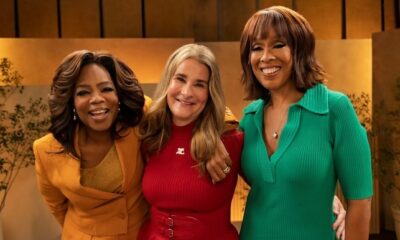Features
Tokunbo Kujore: We Need African Women & Girls Included in Global Matters
We must take action. Some may say that Africa is Africa’s number one problem; yes, I agree, we have major challenges to overcome in almost every area. But the opportunity for growth is still present.
 Instead of hitting the club for what has literally been a hot girl summer, I’ve been reading.
Instead of hitting the club for what has literally been a hot girl summer, I’ve been reading.
And I’m vexed.
Once again, the world has somehow managed to successfully exclude African women and girls from the most important global issue of the year: climate change.
After reading Melinda Gates’ The Moment of Lift, a book about gender equity and how empowering women changes the world, I realised that we, alongside women as a collective, were excluded from the evolution of technology and basic healthcare. Even our unquantified unpaid labor seems to be inconsequential to the projected rise of growing economies.
After reading Isha Sesay’s Beneath the Tamarind Tree, a gripping account of the 2014 brutal abduction of 276 Nigerian schoolgirls by extremist terrorist organization, Boko Haram, I felt an immediate connection on a more personal level. I don’t know if it was the heartbreaking account of the kidnap by the Chibok girls shared, the tenacity and bravery of Sessay, or my familiarity with the country, but I realised that we have been excluded from the global agenda altogether.
Unfortunately, with this story in particular, the fact remains that 112 Chibok girls are still missing, while those who have platforms or are in positions to intervene internationally, are conveniently silent.
After reading a groundbreaking study done by Project Drawdown, where educating girls came in at an outstanding 6th place on the list of the 100 most powerful solutions to addressing climate change, I realized that even if we were living in an inclusive society, 52 million girls in Africa, primary to secondary school age, don’t even have the opportunity to be a part of the climate change conversation, because they are not in school.
All of which led me to ask: Does the world care about African women and girls?
Here’s the breakdown:
Our opinions have not been taken into consideration around extremely important issues that will affect us and the continent. However, facts have shown that making quality education a priority, acknowledging our value in all sectors – especially agriculture and including our stories and challenges in the global conversation – is essential to building and creating sustainable solutions; especially around the very real, despite what some believe, climate change. Doing so can lead to achieving the Global Goals that will end extreme poverty.
The yields from investing in girls’ education are indeed substantial. A Brookings study on girls education and climate change shows that every additional year of school for a girl measurably improves her country’s climate resilience by 3.2 points. With proper education, not only will she be given information about effective environmental practices, but if she participates in 12 or more years of education, she will have four to five fewer children than her peers with little or no education.
As a result, with effective family planning, carbon emissions can significantly be reduced. This alone is calculated to be more effective than commonly promoted strategies, like recycling and other proven methods that reduce our carbon footprint.
In addition to education, while women are the primary farmers of the world, our gender disparities and inequity in agriculture are also alarming. According to the Cooperation in International Waters in Africa (a World Bank partner program that assists riparian governments in Africa unlock the potential for sustainable, climate resilient growth), by 2020, up to 250 million people in Africa may suffer from decreased access to water, and yields from rain-fed agriculture may drop by 50 percent, as extremes of drought are on the rise.
If the varying challenges affecting our safety and wellbeing during work on farms are considered before major global decisions are made, instead of being overlooked, the continent could thrive and benefit from positive outcomes. Well-prepared and efficient farmers who are given the right tools and resources will understand the effects of their work, and thus can make environmentally friendly decisions.
What does this mean for the world and decision-makers in Africa? Quite simply, we must be included. Aside from the humanitarian benefits of inclusion, economically, it doesn’t make sense to silence a people who have the power to increase the annual GDP an average of 3 percent.
It’s also senseless to stand on the sidelines and intentionally stay silent. We must take action. Some may say that Africa is Africa’s number one problem; yes, I agree, we have major challenges to overcome in almost every area. But the opportunity for growth is still present. While some countries have managed to overcome political and economic hurdles, there are many countries who have a lot of work to do. Quite frankly, our inclusion should not be an afterthought. The challenges of African women and girls should not become global trends and then disappear without sustainable solutions.
For equality and girls’ education advocates, as we invest in human capital and create platforms that will benefit women and their communities, we must make educating our girls and providing safe and inclusive education spaces a priority as well. If women and girls are not included in conversations around dire issues, we are doing ourselves a major disservice.
In the spirit of taking action, I started Afro, a platform to celebrate African girl excellence and provide access to quality education and programming to girls in Africa. With education partners in six countries across Africa, and a mission to achieve Sustainable Development Goal (SDG) 4: Quality Education, Afro was created to influence education reform and impact generations by achieving the SDGs through education. We provide scholarships and mentorship in the form of creative entrepreneurship workshops that teach financial literacy and social-impact based business models to primary through secondary school girls.
Our programming includes: STEAM and non-traditional curriculum, along with literacy, feeding initiatives, WASH and menstrual hygiene practices and products. This fall, we will be launching a new product and initiative that will connect and inspire women and girls through technology. Education breeds opportunities, strength and solutions, and we are doing our part to make sure that African women and girls are heard and included.
The Girls Opportunity Alliance, headed by former First Lady of the United States and author of the New York Times best selling book Becoming, (another inspirational and empowering book about defining womanhood for oneself), Michelle Obama, showcases the projects and platforms that share the powerful stories of women and girls through action. Cheers to the women and men who are taking the lead on global matters, especially those of environmental affairs.
While I write from the perspective of an African woman, all women and girls around the world must be included in global conversations and decision-making. In just a few weeks, world leaders will convene at the 74th session of the United Nations General Assembly to discuss policies and new agendas. I hope that our voices are equally represented.
It is said that insanity is doing the same thing over and over again and expecting different results. By excluding indispensable groups from important matters, we are doing just that. If we plan on ending extreme poverty, achieving the Sustainable Development Goals, and solving the issues surrounding climate change and global warming, especially in Africa, then we must take action. We must unmute the voices of historically marginalised people and include women and girls in pivotal conversations, or else the cycle will continue.
Nobel Peace Laureate and women’s rights activist Leymah Gbowee said it best when she said, “It is time for women to stop being politely angry.” We refuse to play nice anymore. We can’t afford to.





















